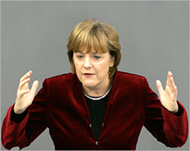Schroeder seeks confidence vote
German Chancellor Gerhard Schroeder has called a vote of confidence in his government for 1 July, a high-stakes gamble to force an early general election which opinion polls show he will lose.

If Schroeder loses the vote, parliament will be dissolved leading to an election in mid-September, a year ahead of schedule.
His move follows a bitter defeat for his Social Democratic Party (SPD) in a state vote on Sunday in its traditional stronghold of North Rhine-Westphalia where it had ruled for nearly four decades.
The chancellor said the rout “jeopardises the political basis for the continuation of our task” and had undermined the government’s attempts to introduce controversial reforms in the eurozone’s biggest economy.
Schroeder made the decision to call the vote of confidence in the Bundestag or lower house of parliament after a brief meeting late on Monday with President Horst Koehler, his press office announced.
Disgruntled voters
If, as seems likely, deputies of the governing coalition of SPD and Greens vote against Schroeder, parliament would be dissolved and elections would be held within 60 days, in other words by 18 September.
Worryingly for the SPD, its traditional working-class supporters in North Rhine-Westphalia deserted the party in droves in favour of the conservative Christian Democratic Union (CDU).
 |
|
The ruling SPD-Greens alliance is |
The result showed how disgruntled many Germans are over national unemployment figures – around five million – and the government’s programme of social and economic reforms, which have proved deeply unpopular.
Germany’s top-selling tabloid Bild welcomed Schroeder’s call for early elections, but said it was a risky move.
“By taking the bull by the horns, he is possibly sparing the country 18 months of political paralysis,” an editorial said.
“Choosing new elections as a way out reveals a sense of hopelessness, but it also shows Schroeder’s courage.”
‘Fear of death’
But the online site of news magazine Der Spiegel was less kind, saying his government was committing “suicide for fear of death”.
The SPD polled 37.2% in North Rhine-Westphalia, lagging far behind the 45% for the opposition CDU.
|
“The issue which concerns people most is unemployment, or how we can create jobs and stimulate growth and how we can get the country out of debt” Angela Merkel, |
A poll published late on Monday showed that if the election were held on Sunday the Christian Democrats would get 46% and the SPD 30%, while the Greens would get 7%, just like the liberal FDP.
The poll, which mirrored the message of previous national polls, was carried out on a sample of 1000 people by the Infratest Dimap Institute for the ARD television channel.
Angela Merkel, the East German-born leader of the CDU, looks set to secure her party’s nomination as the candidate for the chancellery, giving her a chance of becoming Germany’s first woman leader.
She hailed a “sensational result” in North Rhine-Westphalia and said her party’s general election strategy would be based on creating jobs.
Bitter defeat
“The issue which concerns people most is unemployment, or how we can create jobs and stimulate growth and how we can get the country out of debt,” Merkel said.
Schroeder’s authority was in tatters after the latest in a series of damaging performances for his party.
 |
|
Angela Merkel looks set to be the |
It now controls only five of Germany’s 16 states and has so few seats in the Bundesrat, or upper house of parliament, that its ability to pass further reforms is at risk.
The defeat in North Rhine-Westphalia, a state traditionally dominated by the dying coal and steel industry, was especially bitter because it was the last remaining state to be governed by the same SPD-Green coalition, known as red-green, that rules on a federal level.
The Berliner Zeitung newspaper said: “Red-Green has reached the end of the road.”
Schroeder, 61, became German chancellor in 1998 and won re-election by a hair in 2002 thanks to his coalition partner which was doing well.